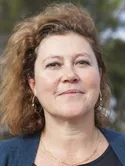Keynote speakers
Catherine Gall

A French native who has studied and worked in 5 countries, Catherine Gall is a creative design thinker with a passion for applying human centered design methodologies to solve urban and territorial challenges. With a background in Business Management from the Strasbourg School of Business, she has worked in strategy and innovation for more than 25 years in the corporate interiors industry. She has conducted workplace transformation projects for leading corporations and education institutions in Europe, the USA, the Middle East, Africa, and China. She led and co-authored the exploratory ethnographic research called “Culture Code” aiming at investigating cultural factors that influence the design of working and learning environments in 11 countries. Since March 2020, she is the Executive Director of the Sorbonne based Research Lab called Chaire ETI (Entrepreneurship Territory Innovation) created by Professors Carlos Moreno, Didier Chabaud and Florent Pratlong and specialized in challenging conventional city planning models. Chaire ETI is well known today for the body of research called “the 15-minute City / 30 mn territory Model”. She is a regular author and visiting lecturer in several business and design curriculums in Europe. She is constantly seeking to understand the interplay of space, technology, culture and behaviors to drive positive impact for human beings and organizations.
Keynote: The Power of Urban Proximities
Karst Geurs

Prof. dr. Karst Geurs is Full Professor of Transport Planning at the Department of Civil Engineering and Management, Faculty of Engineering Technology, University of Twente, the Netherlands. His research focuses on accessibility analysis and modeling, linkages between land-use, transport and technologies, travel behavior research, transport policy evaluation and sustainable transport. He has over 100 publications listed in Scopus, including four edited books. He is president of the Network of European Communications and Transport Activities Research (NECTAR), member of editorial board of the Journal of Transport Geography, and served as Editor-in-Chief of European Transport Research Review between 2017-2023.
Keynote: Mobility hubs: a game changer for sustainable and inclusive mobility?
Karen Lucas

Dr. Karen Lucas is Professor of Human Geography and Director of Research in the Department of Geography within the School of Environment, Education and Development (SEED). She is deputy director of the Manchester Urban Institute and leads its Transport and Mobilities research group. She has 25+ years’ experience of delivering social research into practice in transport, employing a variety of mixed methods approaches to issues of mobility, accessibility and social justice.
Key-note: Why social inclusion matters in transport planning now and in the future.
Cecília Silva

Cecília Silva is an Associate Professor with Habilitation at the Faculty of Engineering, University of Porto (FEUP), and senior researcher at CITTA – the Research Centre for Territory, Transports and Environment – where she coordinates the transversal thematic area on Accessibility and Mobilities. She is specialized in Urban Planning and Mobility Management, with a core focus on crafting sustainable, liveable cities that provide citizens with enriching experiences. Her main research interests focus on accessibility planning and integrated land use and transport policies for human-scale cities, developed in close collaboration with local authorities.
Key-note: Going Nowhere fast: undermining proximity with speed
Frank Witlox

Frank Witlox, PhD, obtained his doctorate in Urban Planning from Eindhoven University of Technology. He also holds Master's Degrees in Applied Economics and Maritime Sciences from the University of Antwerp. At present, he is the Head of Department and a Senior Full Professor of Economic Geography at Ghent University's Department of Geography. His main focus in research is understanding and modeling travel behavior of people. He is a Member of the Academia Europaea (MAE) and a Fellow of the UK Academy of Social Sciences (FAcSS).
Key-note: Shedding light on cycling in the dark: some evidence from Flanders (Belgium)